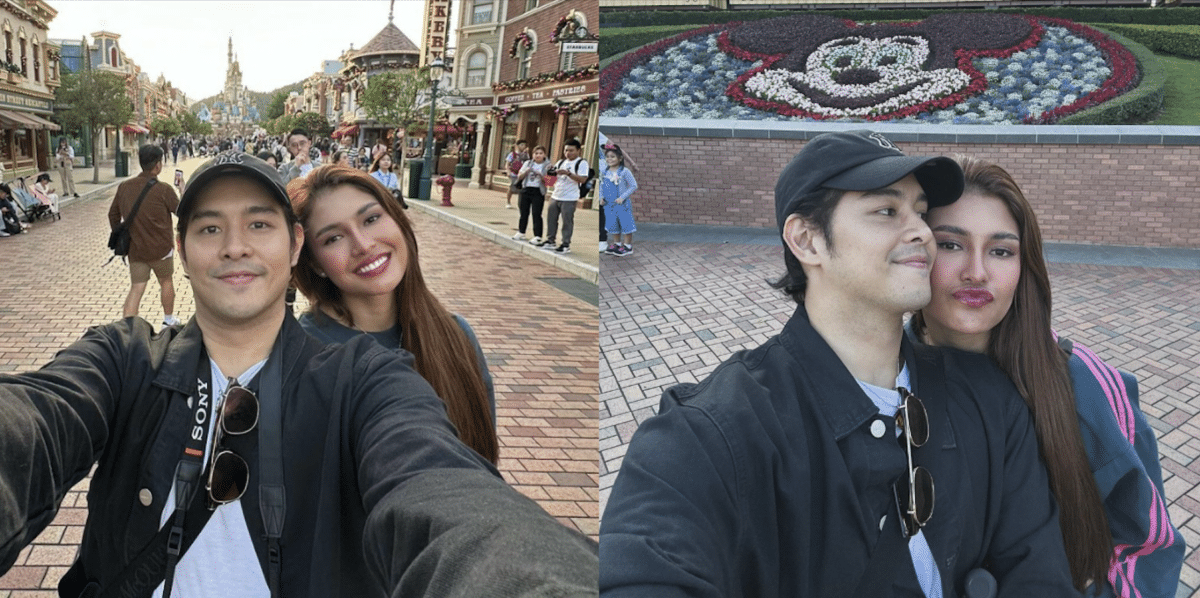Like any good child of an immigrant, Laufey Lin Jónsdóttir spent most of her school vacations visiting family abroad. “We went to Beijing every summer,” she shares. “My grandparents are both classical musicians and they taught in a lot of different cities, so we’d often get to travel around China.
” Sitting cross-legged in front of an open window in her Los Angeles home, the 25-year-old , who performs under the mononym Laufey, is dressed simply in a black tank top and striped trousers. A single gold chain around her neck carries a small pendant, occasionally twinkling as it catches the soft sunlight streaming in. With her hair curling naturally around her temples, there is no trace of her signature cat-eye or retro frosty eyeshadow .

She is fresh-faced, skin glowing healthily. She continues: “I’m so thankful that my parents were able to give me that experience growing up. It was a huge privilege to connect with the culture like that.
” Born in Reykjavík, Iceland to an Icelandic father and Chinese mother, Laufey comes from—as she describes it—“the school of Asian parenting”. “Icelanders are very relaxed. Kids roam free from an early age; you start making your own decisions very young,” she says.
“I had more of a traditional Chinese upbringing. My parents, my mother in particular, were a little bit more strict on things like practising instruments. It had its pros and I’m grateful for it, but I felt very different from my friends.
After school, many of them would go for their play dates, but I would go to a cello or piano lesson.” After a thoughtful pause, she elaborates: “Iceland can feel homogeneous. There are very, very few Asians there, and few foreigners at all.
When I would leave my school, it would feel like leaving a bubble while everyone else got to stay inside.” Feeling different was something Laufey got used to fairly quickly, with her family moving back and forth between Reykjavík and Washington DC in her early years of childhood. She spent her middle and high school years in Iceland, eventually moving to Boston to study at the Berklee College of Music and graduating with a presidential scholarship just three years ago.
“Growing up in so many different places, you kind of lose a sense of belonging. I was both Chinese and Icelandic, but also an American girl as well. Mixing all those different things meant that I never felt like I completely belonged anywhere.
” It could have turned into a painful insecurity, but the masterclass in codeswitching and adapting Laufey went through from a young age instead became her superpower. “I think it’s the reason I’m able to resonate with so many different people in the world,” she agrees. “Adapting quickly to different cultures has been one of my greatest assets as an artist.
” In 2020, while still a student, Laufey released her debut single ‘Street by Street’—topping the Icelandic radio charts. Three years later, her second album, Bewitched , won her her first Grammy. Today, she stands as the world’s biggest streaming artist from Iceland.
At the 2024 Grammys , Laufey won the award for Best Traditional Pop Vocal Album and played cello alongside Billy Joel. What did this formal sort of recognition mean to a young musician who had largely built her following on social media through short clips of original music and wistful covers of jazz standards? “It’s the highest form of validation you can get as a musician,” she says earnestly. “I came up in the music industry through the internet, so to get validation from the Academy felt like I was being seen by other musicians.
” Her fanbase—young, supportive and deeply connected to her through a series of elaborate inside jokes—keeps her going in a different way. To Laufey, the torch of representation she holds as an Asian face in the music world is what makes her work even more meaningful. She recalls the empty feeling in her adolescence of not having any Asian singers to count as role models.
“I am only half Asian and still this is the most Asian representation we’ve seen in pop music in a long time. I can’t imagine what it is like for fully Asian girls who want someone to look up to. I hope I can be someone for my fans to see themselves in because that’s one of the most powerful things in the world.
” Laufey’s musical inspirations growing up ranged from Ella Fitzgerald to Chet Baker. “Norah Jones was a huge one!” she adds excitedly. “I listened to a lot of old music as a kid.
To be honest, I was a good rule follower and listened to whatever my parents played.” Jazz, a not-so-incidental childhood companion for Laufey, is today a main character in the universe of her music. Her biggest hit in Bewitched , ‘From the Start’, sees the third-generation musician masterfully blending bossa nova-style instrumentation with jazz-inflected vocals in her signature low timbre and careful diction.
She scats prettily for 10 seconds in the middle of the song—her flourishes taking on a decidedly Chet Baker-esque slant. As guitar moves into violin and the occasional poetic tones of harp, Laufey conjures the old-world charm of the Great American Songbook with her musicality. But her lyrics are agonisingly contemporary and relatable.
She sings conversationally about unrequited crushes, imposter syndrome and wanting to feel a sense of belonging in the big, wide world. In weaving together the old and the new, Laufey is doing more than creating a desirable, Pinterest-friendly aesthetic filled with vintage dresses and hair bows. Instead, she is providing an accessible gateway to genres that, beautiful and historic as they may be, have progressively waned in commercial relevance.
For many of her younger listeners, her songs may represent the first time they add a classical or jazz track to their playlists—but hopefully, not the last. Her music, in many ways, signifies a shift in pop culture. She bashfully waves away any assertion that she has become an unofficial youth ambassador for jazz.
“I think that’s a bit of an overstatement,” she laughs. “I love jazz music and I’ve studied jazz. But my music is a mix of a couple of different things.
It’s a product of the music that I’ve always loved to listen to and what came most naturally to me. I would have felt inauthentic doing anything else starting out.” Having toured on and off for the better part of a year now, Laufey is doing a number of Asia stops this month.
Singapore will be among her shows—tickets, according to the sale platform, were sold out in under 10 minutes. “I love playing concerts, they’ve informed so much of who I am as an artist. I can’t even describe what a gift it is to experience singing the songs with the fans and getting to see them all over the world.
What an amazing thing to get to do in this life.” Still, for someone who grew up with the freedom of boundless nature at her doorstep—“In Iceland, no matter where you live, you’re just a couple of minutes from the beach”—the physical and mental pressures of touring are felt deeply. “You’re waking up in a new city and a new bed every day, which takes a lot of adapting.
” She carefully ponders the importance of mental health, something she was not necessarily taught to prioritise in her childhood. As with anything valuable, maintaining her mental health has taken a little bit of sacrifice. “This year, I’ve had to make some decisions that weren’t guided by what would bring me more success, but rather, what would help me as a human.
That’s been one of the most difficult things I’ve done in this career. It still feels a little bit frivolous, almost.” She continues pensively: “It’s like, have I earned the right to think about myself? But I know now that mental health is an integral pole in any life—the central pole, if anything.
If you are mentally struggling, it’s really difficult to get anything done.” Despite her skyrocketing public profile, Laufey remains close to her family—especially twin sister Junia, who holds the role of Laufey’s creative director and goes on tour with her. In fact, her sister is the mind behind the famous nostalgic, vintage-forward aesthetic she has become known for, Laufey claims proudly.
“Anything that comes out of a project that is not literal music is run by Junia. She’s brilliant and knows me well, so we are usually aligned on what we’re thinking of at the moment, be it a style or an idea.” She reminisces fondly: “Junia and I used to go to school in the snow wearing ballet flats and skirts while everyone else was wearing winter clothing, just because we insisted on dressing that way.
What you see of me as an artist is essentially the aesthetic of our lives.” Her working style with her sister, in her words, is “quick, honest and productive”. “We don’t dilly-dally and we don’t get offended.
I trust her and don’t think I could do this without her. She’s my body double who is doing everything with me except for the singing. We get stopped on the street the same amount because no one knows if it’s me or her.
” The ‘is it Laufey or Junia?’ game has caught on among Laufey’s fans, who seem to enjoy the sisters’ close-knit bond and irreverent mutual banter. Their twinship is the subject of a significant chunk of Laufey’s social media comments—something that might have rubbed a different popstar the wrong way, given the usually individualistic nature of pursuing a career in the entertainment industry. Laufey’s approach, instead, seems to be rooted in kinship.
“Everything is better when it’s communal. I have an amazing management team and a label that supports me in what I want to do. I bother my manager with the tiniest things and he’s always there for me.
And then there are the fans. They have been there since the beginning and I have such a direct sense of why I’ve gotten to where I’ve gotten—it’s really because of them. I rely on them to guide me on my journey.
” Currently living in Los Angeles, she divides her time between work and other things that are important to her—like her book club, coffee dates with friends or the excellent Chinese food she finds in the city. “As a child, I had an ayi , or nanny, who helped raise my sister and me. We would cook a lot of Chinese food at home.
Dumplings were my favourite. This is one reason I love living in LA so much—the cuisine here is so good. I get to eat delicious dumplings as often as I want.
” The Asian community she now finds herself surrounded by is something she also treasures deeply. “We all have this experience of being not completely at home anywhere. We come from all over, which is really special.
” Then, what does home mean to her now? “Home is always Iceland,” she says with a laugh. “But I guess LA is my home now too. You can have multiple homes, can’t you?” Editor-in-chief Desmond Lim Photography Maddy Rotman Styling Nancy Kote Hair Takuya Sugawara Make-up Hayley Kassel Photographer’s assistant Michael Camacho Stylist’s assistants Isabella Hellyer and Bianca Lexis Producer LE Seydel/Ted & Jane Production designers Cody Rogers and Parsa Rezaee Production coordinator Rachel Nagao Production assistant Ziya Morris Cover image Loewe dress; hat and bangle, stylist’s own The September ‘Kitsch’ issue of Vogue Singapore is now available online or on newsstands.
.



















